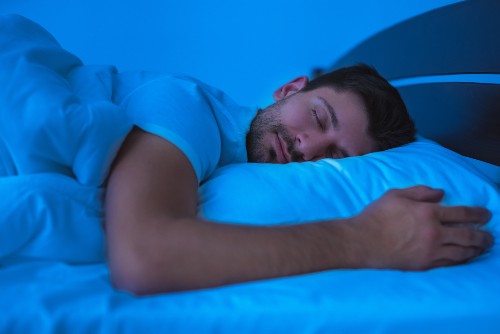
All your questions about snoring: Answered
Snoring is common, around half of people snore at some point in their lives1. For most people, snoring is one of those annoying habits we can’t help, but it can be disruptive to our everyday lives, and in some cases, lead to more serious health conditions. We spoke to Jack Bowker, a dentist at Bupa Dental Care Deysbrook, to find out exactly what causes snoring and how a dentist can help alleviate the problem.
1. So, what actually causes snoring?
Snoring is caused by a turbulent airflow, which causes the tissues at the back of the throat to vibrate. When you sleep, particularly on your back, the muscles relax and the jaw falls back. This causes a partial closure of the airway when you snore, or even a complete closure if you suffer with a condition called obstructive sleep apnoea.
When this happens, air has to be forced between the tongue and the back of the throat. This makes the throat vibrate loudly, which we call snoring.
There are also certain risk factors that might contribute to your snoring – such as alcohol intake (particularly before bed), your BMI and the size of your neck.
2. How can you stop snoring?
This all depends on the root cause of your snoring. However, there are some key things which can help. Firstly, don’t drink alcohol late at night. Alcohol relaxes your muscles, making your airway more likely to close. You might also snore louder if you’ve been drinking because your throat is dry, as alcohol makes you dehydrated.
Leading an active and healthy lifestyle and maintaining an ideal weight can also reduce pressure on your airway. Anyone with a neck size of over 17 inches and a BMI of above 30 is at high risk of snoring.
If you’re a smoker, try to give up. Smoking irritates your throat and nasal passage, which can cause swelling. If your nasal passage becomes congested, it makes it difficult for you to breathe.
3. Is snoring bad for you?
Occasionally, snoring isn’t usually anything to worry about health-wise. However, research shows that regular snorers are at increased risk from diseases such as hypertension2, also known as high blood pressure.
Snoring can also disrupt your sleep, which leaves you feeling more tired throughout the day. This could decrease your productivity at work or mean you have less energy to do other activities such as exercising or socialising. It can also put a strain on your personal relationships by keeping your partner awake at night. What’s more, simple snoring can develop into obstructive sleep apnoea, which is a much more serious condition that can actually shorten your life expectancy.

4. What is obstructive sleep apnoea?
Obstructive sleep apnoea occurs when your airway gets completely or partially blocked as you sleep. So, you essentially stop breathing for 10 seconds or more per episode. This may happen hundreds of times throughout the night, often accompanied by gasping or choking noises that can wake you up. OSA causes disruption to your normal sleep cycle and stops you from having a refreshed sleep. Many people don’t know they have sleep apnoea because they don’t remember waking up during these episodes.
If left untreated, sleep apnoea can lead to serious health conditions such as heart failure, arrhythmia and even strokes. These can all shorten your life expectancy.
5. What are the symptoms of obstructive sleep apnoea?
One of the main things that happens with sleep apnoea is you stop breathing in the night. Quite often you won’t notice this, but a partner might. They may notice you choking in your sleep, snoring loudly or waking up several times during the night.
Another symptom is nocturia, which means you wake up regularly in the night to urinate. You may also suffer daytime tiredness, headaches and difficulty concentrating because of the unrefreshed sleep.
If the effects of snoring are impacting your everyday life, it’s time to do something about it.
6. How is obstructive sleep apnoea diagnosed?
Dentists can’t diagnose OSA, but we can screen patients and refer suspected cases to a GP or a doctor who works in sleep medicine. To get an official diagnosis, you need to undergo a sleep test. If you need this, your GP will talk you through the process.

7. How can a dentist help with snoring?
If you’re worried about snoring, you can see your dentist. We can provide a screening that assesses the severity of your snoring. This helps us spot tell-tale signs of OSA and, if appropriate, we can then refer you to a sleep centre or to your GP for an official diagnosis.
We can also help you by using a snoring appliance. These appliances prevent the jaw and tongue from falling backwards, which obstructs the airway during sleep.
Anyone who snores can use one of these devices, you don’t need to have OSA. It’s worth noting that snoring often progresses to OSA, and early preventative treatment can have a significant impact on reducing its effects.
8. Why should I get a snoring appliance made by a dentist?
Custom-made snoring appliances are an effective method of treatment, and we often find that patients get on better with the appliances better than other treatments available like CPAP, which is a mask that you wear over your mouth while you sleep to help you breathe.
What’s more, custom-made appliances tend to fit better and therefore work better than appliances you can buy over the internet. These products aren’t necessarily effective and could even worsen your snoring over time.
Seeing the dentist for an anti-snoring appliance also comes with the added benefit of having regular follow-up reviews, which helps minimise any potential side effects and increases the likelihood of successful treatment.
9. What should I do if I’m worried about my snoring or think I have sleep apnoea?
We have practices across the UK that can help you if you’re suffering with snoring. We can either refer you to a GP for an official diagnosis if they suspect you have OSA or create a custom-made snoring appliance that can help reduce the effects of simple snoring.
Get in touch with your local Bupa Dental Care practice to see if they offer snoring treatment. If they don’t, they’ll happily direct you to another practice to help.
1- American Academy of Sleep Medicine https://sleepeducation.org/sleep-disorders/snoring/
2 -British Dental Association: https://www.sleepfoundation.org/articles/how-sleep-apnea-affects-blood-pressure


